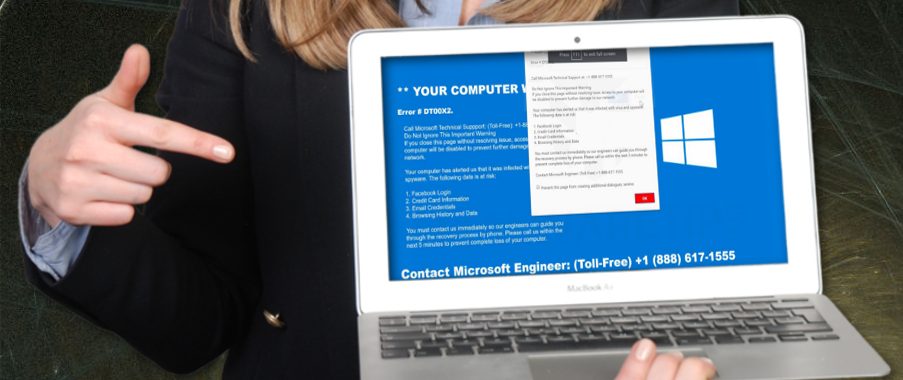Fake alert about spyware scams people into calling tech support
Esolutions spotted a misleading alert that states about the risk of losing personal information that is nothing but an Error DT00X2 malware. This scam misuses MS Windows name and works as a typical tech support scam that suggests people calling a fake support number provided in the same error window as the main message.
This pop-up window displays the alert stating that this a Microsoft Windows support warning about your data which is at risk. According to this message, your Facebook logins, passwords, credit card information, email and browsing history can be accessed by the malware or spyware.
However, this information is not at risk because the main issue your computer has is this malware that displays a fake error message, not the alleged spyware. You shouldn’t call the provided +1 888 617 1555 number because people behind the scam are willing to gain remote access on your device and possibly steal sensitive information to steal money or extort the payment directly via phone.
The functionality of tech support scam
The main purpose of these people who developed this malware and scam message is to get your money either by tricking you into giving them remote access to your PC or giving valuable information through the phone. They use your credit card credentials and steal money from you or install keystroke loggers to collect information you enter on banking sites.
There is no relation between Microsoft and this scam. The only reason these scammers use the name Of Microsoft is to look legitimate and lure people into calling the provided number. This is a method scammer often use to lure people. Unfortunately, calling people behind this alert can lead to real data or even money loss.
Reasons you may see this message on your screen
This scam is closely related to adware program or another silent intruder that possibly came from deceptive ads or during insecure installation of freeware. Coupons, pop-up ads, banners, and various intrusive ads may deliver these PUPs to your system, and the program starts to work immediately. In this case, the application delivers various redirects and these fake alert messages about the alleged danger.
You can avoid these cyber infections if you pay more attention to processes happening on the device. During freeware installations use Custom or Advanced options instead of Default or Quick, so you can de-select additional programs and make sure that you get applications you need only.
Be aware that any Microsoft support people are not displaying messages about these issues regarding spyware, malware or data at risk. If you receive a similar note, firstly try to search the number on the internet before calling.

